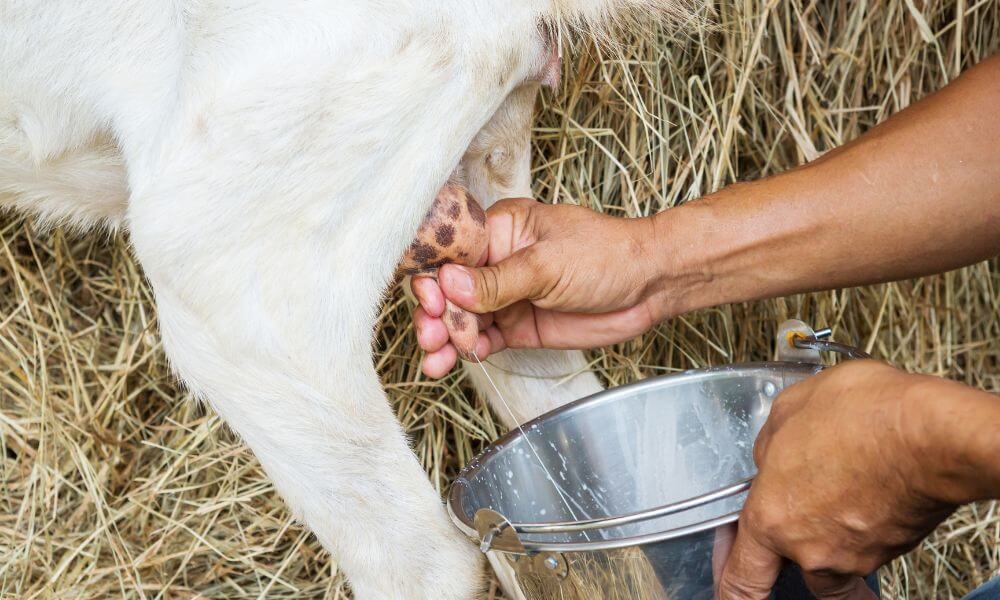In fact, all milk products that come from an animal will contain calcium, as will virtually all plant-based milks.
Milk contains calcium, usually in large amounts, and is a great source of this essential mineral.
But, how does goat’s milk compare with other varieties of milk in calcium content?
Let’s take a look.

Is goat’s milk high in calcium?
Goat’s milk is an excellent source of calcium.
Three, 200ml (or just under 1 cup) servings of goat’s milk a day will provide more than 100% of an adult’s recommended daily intake.
Furthermore, the calcium in goat’s milk and dairy products in general is more easily absorbed and used by the body, than calcium that is locked away in high calorie foods.
So, as I mentioned, one cup of goat’s milk contains around 327mg of calcium, which is just over a third of an adult’s recommended daily intake.
Cow’s milk is not much different, though just a little bit lower at 305mg per cup.
It will depend on the type of milk, in both cases; whether it’s whole milk or skimmed.
For the average, 1% goat’s milk you will have around 327mg of calcium, and 305 in cow’s milk.
Other popular milks include a number of plant-based milks.
Oat milk, for example, contains around 280mg of calcium per cup.
Almond milk only contains around 180mg of calcium per cup.
So, plant-based milks are slightly lower in calcium, although they do make up for it in a number of other benefits.
So, in terms of calcium content, there isn’t a great deal of difference between goat’s milk and cow’s milk.
Goat’s milk has a slight advantage, but cow’s milk is likely to be more readily available.
But what is calcium actually for? How much do we really need?
What is calcium?
Calcium is a mineral that is essential for life.
As I said, it is perhaps most important in the early stages of life when it is necessary to build strong bones and teeth.
We need less later in life, but it is still an essential part of our diet.
As I said, its main function is building strong bones, and almost all of the calcium we consume is used in our teeth and bones.
It also enables our blood to clot which prevents us from bleeding from small wounds.
It helps our muscles to contract as needed, and it even keeps our heart beating.
Humans have for a long time gotten much of the calcium they need from dairy products, but we are the only species to continue doing this into adulthood.
There are lots of other sources of fiber, like leafy greens, legumes, dried fruit and tofu.
Calcium is a very common mineral in a lot of foods.
On average, adults need about 700mg of calcium per day in their diets.
Most of us are able to get this amount through regular means, without having to take supplements.
However, calcium carbonate and calcium citrate are two recommended and popular calcium supplements to take.
So, goat’s milk is very high in this essential substance.
But there remains nonetheless a perception that goat’s milk is bad for you, so let’s unpack that a bit.
| Related Articles |
|---|
Why is goat’s milk bad for you?
The simple answer is that it isn’t, necessarily.
Milk and dairy products in general can be a touchy issue for many people, as what is known as lactose intolerance is extremely common.
This is where a person’s body lacks the necessary enzyme to break down the sugar present in dairy products, and eating it causes them digestive discomfort.
This can also develop later in life; you don’t have to be born with it.
So, if drinking goat’s milk (or indeed, consuming any dairy product) gives you gastrointestinal discomfort, you could be suffering from lactose intolerance.
Of course, goat’s milk is no different from cow’s milk in this way.
Except, in fact, that goat’s milk does contain slightly less lactose than cow’s milk, and higher amounts of other nutrients that increase the overall benefit.
It’s easier to digest. Lactose intolerance is different for everyone and there are varying levels of tolerance, so if you do wish to try goat’s milk as an alternative it may be better for you.
So, goat’s milk isn’t really “bad” for you in any sense that other milks aren’t. It can cause some degree of digestive discomfort, but only you will know your own diet.
Try a little bit and see how you react. It will be a great source of calcium if you can’t get it from cow’s milk.
So, yes, goat’s milk is high in calcium.
All milks are, since growing babies need it more than anyone.
It’s even higher in calcium than cow’s milk, so it makes a great daily source of calcium if you can get it.
If you can get fresh goat’s milk from your own goats, even better!
